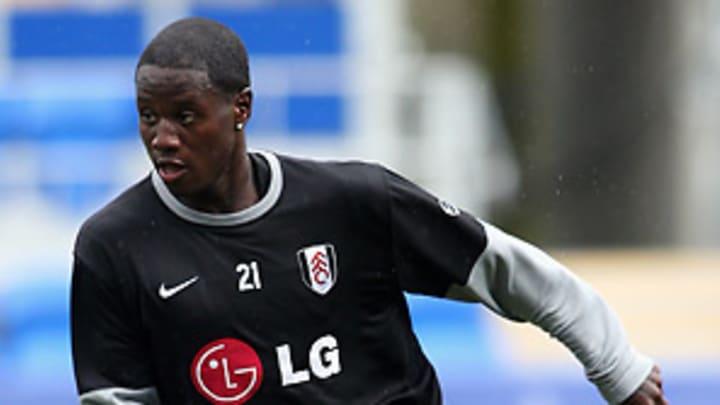Can Johnson succeed in Greece?

Named for Alexander the Great's half-sister, Thessaloniki is alive, beautiful and energetic. Some of the finest Byzantine churches outside of Istanbul give Egnatias Street a kind of glow, as do the lovely lighter-skinned Macedonian women. On clear mornings, Mount Olympus is visible to the south, and in the evenings, the Turkish-influenced restaurants buzz.
So there's the good news for Eddie Johnson, who just joined local club Aris on loan from English Premier League side Fulham: If he had to be banished to the provinces, he could've done worse than coming here. Much worse.
The bad news is the whole soccer thing, and the difficulties Johnson will face trying to resurrect his career in the Greek Super League.
Contrary to popular opinion, this is not a league where many foreigners have honed their skills or made their names. The Greek league sports a rugged schedule of games played in front of sparse crowds, unless you're playing for one of the big three Athens clubs: Olympiakos, Panathinaikos or AEK. If you're not, you might as well play a video game, because that's the only chance you've got of winning any titles.
Then again, Johnson isn't coming here to win trophies, is he? He's coming here to play, with the freely admitted hope of earning one of those up-for-grabs striker spots on Bob Bradley's World Cup roster. Johnson made only four appearances for Fulham in the fall, so any playing time (much less regular goal-scoring), even for a relatively small club like Aris, would go a long way.
It's hard to think of a more perfectly named soccer club than Aris. Founded in 1914, it was named for the Greek god of war, more commonly spelled "Ares." The heroic moniker has helped some, as Aris is one of only three teams outside of Athens to be crowned domestic champions. (One of the Athenian triumvirate has won all but six of the national championships since 1928.)
But Aris has won nothing since 1946. (Well, they did win the Greek Cup in 1970, but that doesn't really count for much in my book.) Worse, it's not even king of its own domain, playing second bouzouki to Thessaloniki's other side, PAOK (which won two of those three non-Athenian championships since 1946). In fact, Aris' soccer team is probably not even as well-respected as the club's basketball team, which dominated Greek basketball in the 1980s.
But the club recently made an interesting strategic decision. Much like the city it represents, it has taken on a decidedly international flavor. Argentine coach Héctor Cúper, hired in November, has the most international roster in the Super League, including six Argentines, three Brazilians, three Spaniards, a Frenchmen, a Bolivian, a Slovakian, a Tunisian, an Albanian, an Irishman (huh?) and now an American (maybe two, if the rumors about FreddyAdu pan out) alongside a handful of Greeks.
This globalist approach, in conjunction with the tough league, could be Johnson's salvo. The side, currently in sixth place, is struggling to find the net; its top scorer, Javier Cámpora, has only four goals.
EJ has always had the tools to be devastating -- speed, size, strength and technique. He hasn't always put it together correctly, too often running with the ball when he should pass and move or vice versa, but he did score a ton of goals in MLS. Aris' willingness to play football means a striker like Johnson could clean up running onto through balls or attacking spaces.
But more important, I hope Johnson's arrival in Thessaloniki, this little city with an outsized history, will reignite his attitude. I still remember his absurd penchant for crediting his sports psychologist for the goals he scored in Kansas City.
Don't get me wrong, I'm all for psychoanalysis and therapy, but come on! Successful athletes possess something no shrink can unpack: an inner fire. It's like porn: You know it when you see it. It's in the crazed lunge to get to that cross before the defender, the brave slide to reach a loose ball before the goalkeeper, the desperate hounding of a center back going toward his own goal. Johnson might still have some of this, but I haven't seen it recently.
The Americans who have succeeded in Europe have all carried a massive chip on their shoulders: Clint Dempsey, Claudio Reyna, Brad Friedel. It's like they had something to prove. What does Johnson have to prove?
An unfortunate twist of timing means I won't be able to ask him that question yet. But on Tuesday night, I'll be in a café near Aristotelous Square, watching the Atromitos-Aris match with some fans here in the city, wondering if Johnson's visit to Thessaloniki will bear as much fruit as it has for others.
